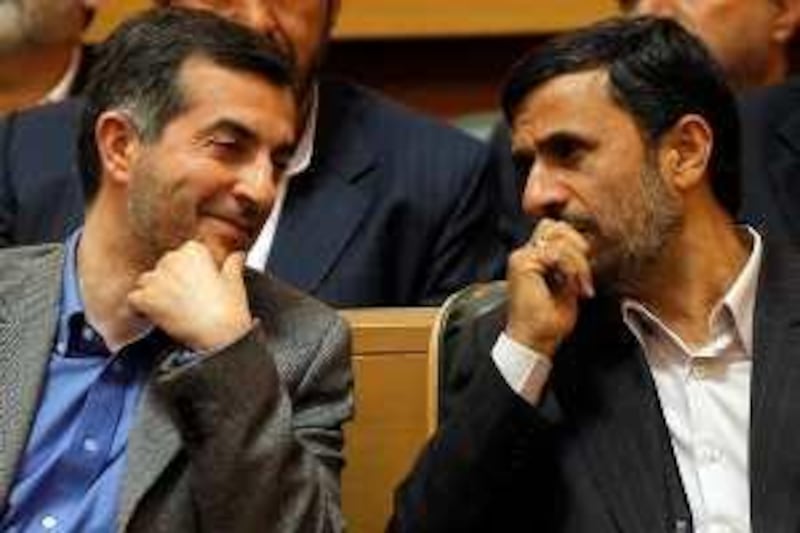Iran's president, Mahmoud Ahmadinejad, suffered a humiliating setback yesterday when his controversial choice for first vice president reportedly resigned just three days after being appointed, following uproar from the president's own hardline camp. Esfandiar Rahim Mashaie, a relative of the Israel-bashing president, was a bête noire of many hardliners after he asserted last year that the Islamic republic was a "friend of the Israeli people". His top-level posting came as Iran was already in crisis over the president's controversial re-election.
Press TV, Iran's state-run English language channel, said yesterday that Mr Mashaie had walked away from the job. There was no immediate independent confirmation of his resignation. Mr Mashaie's appointment had infuriated the regime's hardline wing, whose support Mr Ahmadinejad needs to get his cabinet approved by a fractious parliament after his inauguration next month. Even before the furore over his comments on Israel last year, Mr Mashaie had dismayed hardliners by allegedly watching unveiled women dancing at an Islamic tourism exhibition in Turkey.
In a rare public rebuke, Ayatollah Ahmad Khatami, an Ahmadinejad supporter and member of Iran's top legislative body, declared yesterday that the president had shown a "twisted face to clerics and elites" by appointing Mr Mashaie. "Ahmadinejad should not challenge conservatives with such decisions," he said. The president's choice of first vice president does not need parliament's approval, but his new cabinet ministers will. Mr Ahmadinejad ran the risk of a backlash from the assembly over Mr Mashaie's appointment at a time when many expect bruising encounters with the 209-member assembly over his cabinet choices. Two-thirds of its members had ostentatiously snubbed his election victory party last month.
"It would be much better if Mr Ahmadinejad paid more attention to public opinion and Majlis [the parliament] before making appointments," said Hojjatoleslam Hamid Rasaei, a parliamentary deputy in the president's own hardline or "principlist" camp. "Even many of Mr Ahmadinejad's supporters inside his government are in some way opposed to this [Mr Mashaie's] appointment." The hardline daily Kayhan newspaper, which is close to the supreme leader, Ayatollah Ali Khamenei - who blessed Mr Ahmadinejad's "divine" electoral victory - insisted: "It is imperative to terminate the appointment of Mashaie ? in order to respect the wishes of the majority of the people."
The appointment of Mr Mashaie was surprising given the president's anti-Israeli rhetoric, which has done much to tarnish Iran's image and heighten suspicions of the country's nuclear programme. Mr Ahmadinejad has branded the Jewish state a "stinking corpse", frequently predicted its demise and called for Israel to be relocated to Europe, Canada or Alaska. Cynics might say that family ties had superseded ideological differences: Mr Mashaie's daughter is married to the president's son.
Mr Ahmadinejad lost another vice president last week with the sudden resignation of Gholam Reza Aghazadeh, who also held the more sensitive post as the head of Iran's nuclear programme. No reason was given for Mr Aghazadeh's sudden departure but analysts believe it was linked to the post-election turmoil: he was a long-term ally of Mir Hossein Mousavi, the former prime minister who millions of Iranians believe was the real winner of the June 12 presidential election.
"Given the current political impasse, his [Aghazadeh's] resignation's not unexpected and there'll be many others like this ... people who'll begin to separate themselves from Ahmadinejad," said Anoush Ehteshami, a professor of international relations and Iran expert at Durham University in England. Less than 24 hours after the news broke of Mr Aghazadeh's resignation, Akbar Hashemi Rafsanjani, one of Iran's most influential power-brokers and Mr Mousavi's main supporter, galvanised the opposition with an electrifying Friday prayers sermon at Tehran University. The two time former president and leading cleric declared that the disputed presidential election had broken the trust of the people.
Mr Rafsanjani's stance was in open defiance of the supreme leader, who had ordered people to accept Mr Ahmadinejad's victory or face the consequences. Mr Rafsanjani's sermon was accompanied by the biggest pro-Mousavi demonstrations on the streets of Tehran since July 9. The combination of political clout and people power showed that the opposition intends to keep up pressure against what Mr Mousavi has called the "illegitimate" government. Mr Rafsanjani's sermon is likely to invigorate plans to form a broad-based new political grouping of opposition figures and groups to organise acts of peaceful civil disobedience to Mr Ahmadinejad's government.
The president's appointment of Mr Mashaie gave another unexpected boost for the opposition because it opened rifts within Mr Ahmadinejad's support base. Mr Mashaie caused fury early last year when, as a vice president in charge of cultural heritage and tourism, he was quoted by a hardline news agency saying: "Today, Iran is friends with the American and Israeli people ? No nation in the world is our enemy."
His "disgraceful stance" was denounced by 200 conservative parliamentarians and drew a sharp rebuke from Ayatollah Khamenei. The supreme leader said that Iran has "nothing against Jews, Christians or followers of faith", but Israelis "are responsible for usurping houses, territory, farmlands and businesses. They are fighters at the disposal of Zionist operatives." Mr Mashaie promptly backtracked, saying his remarks had been misinterpreted. But he soon did a U-turn: "I have said before that we do not have any hostility against Israeli people and I still say the same thing proudly. Not all Israeli people are wearing [military] boots on the street."
It is unlikely that the president's elevation of his outspoken friend was intended to ease tensions with Israel and the West. After Mr Aghazadeh's resignation on Thursday, Mr Ahmadinejad delivered a characteristically blistering speech, vowing, among other things, continued defiance in the long-running dispute over Iran's nuclear programme. Nevertheless, Mr Aghazadeh's departure as head of Iran Atomic Energy Agency, a post he held for 12 years, is a blow to the regime. He was valued as a skilled technocrat whose managerial skills helped rapidly advance Iran's nuclear activities. His briefings would have been invaluable to Iran's nuclear negotiators if talks with it opponents do resume.
"The whole [nuclear] programme was supervised by his office," Prof Ehteshami of Durham University said. "He was the public face of Iran's nuclear programme, seeing its development to what it is now." mtheodoulou@thenational.ae





